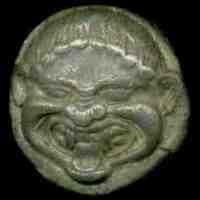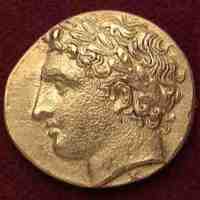
Gorgon's head on a silver coin of Naples
Greek Civilization
Fall 2000

The god Apollo on a gold coin of Syracuse

Gorgon's head on a silver coin of Naples |
Greek Civilization
Fall 2000 |

The god Apollo on a gold coin of Syracuse |
Instructor: Dr. Victor A. Leuci
Texts:
Writing-Intensive Option: Several different types of writing will be part of the course: microthemes, three exams that are predominately essay (two of which must be the take-home versions), and a long paper. Three to six microthemes will be assigned as a means to help participants come to a better understanding of important themes, ideas, and concepts. One to three of the microthemes will be revised on the basis of a conference with me or with a tutor at the Writing Lab; the paper will be revised on the basis of a conference with me. Through conference sessions each student will develop and refine the paper topic. A critique and conference after the completion of the paper may also occur. In addition to meeting with me, the first microtheme will be revised on the basis of a conference with a member of the Writing Lab. In general, participants in the class should highly consider using the services of the Writing Lab and especially the Lab tutors, who can be of tremendous assistance.
Format: The course will consist of both lectures and discussion. The class will occasionally be divided into small groups to treat discussion topics that will most often be based on readings from ancient authors. Microthemes may be assigned based on the results of the small group discussions. The microthemes are especially designed to facilitate the learning of important details and concepts of the course. Often the microthemes will represent the first opportunity to come to grips with an important block of material or ideas which we will treat from several different perspectives or in several different contexts.
Grading: 3 Exams (100 points each); Mini-Exam (50 pts); 1 essay [1800-2400 words long] (80 points); 3 to 6 microthemes [each 500-800 words long] (25 points each). In addtion roughly 10% of your grade will be based on class participation, attendance, web discussion, etc. No late papers will be accepted without prior permission. A hard copy and an electronic copy of papers are due at the beginning of the class period. I expect you to abide by Westminster’s honor code. Let me repeat, no make-up work will be accepted for unexcused absences. A hard copy and an electronic copy of papers are due at the beginning of the class period.
Exams: The exams will be a combination of fill-in the blank or short answer with essays. Usually there will be 10-15 fill in the blank questions worth 2 points each and two essays (300 to 400 words each) worth 35 points each. The essays should be well written in standard paragraph format and replete with pertinent facts to support your thesis (or theses). A review sheet will be typically available on-line one week before the exam as an aid in your preparation. Some exams may have a take-home option (the review sheet for that exam will give more details).The Mini-Exam will be of the same format as the Exams only shorter.
Microthemes and Essays:
Content:
TOPICS AND ASSIGNMENTS (tentative)
|
Aug. 29
|
Tu
|
General Introduction. |
|
31
|
Th
|
The Minoans and the Mycenaeans. Pomeroy Ch. 1, 1-17 |
|
Sept. 5
|
Tu
|
The Mycenaeans, cont. Pomeroy Ch. 1, 18-40 |
|
7
|
Th
|
The Dark Age, Pomeroy Ch. 2, 41-70; Microtheme #1 due; Topic. |
|
12
|
Tu
|
The Dark Age: Art & Archaeology, and intro. to Homer and the Heroic World. The Iliad, von Staden 46-89. |
|
14
|
Th
|
Finish the Iliad. Begin The Odyssey, von Staden 90-124. |
|
19
|
Tu
|
The Odyssey. von Staden 124-149 Microtheme #2 due; Topic |
|
21
|
Th
|
Finish the Odyssey |
|
26
|
Tu
|
EXAM I; Review Sheet for Exam (click here) |
|
28
|
Th
|
The End of the Dark Age; Pomeroy Ch. 2, 71-81. Archaic Greece. Pomeroy Ch. 3 |
|
Oct. 3
|
Tu
|
Archaic Greece. Pomeroy Ch. 3 |
|
5
|
Th
|
Archaic Greek Literature and Art. Pomeroy, Ch. 3, 109-124 |
|
10
|
Tu
|
Sparta. Pomeroy Ch. 4 |
|
12
|
Th
|
NO CLASS. School Holiday |
|
17
|
Tu
|
Sparta. Pomeroy Ch. 4 continued |
|
19
|
Th
|
Athens. Pomeroy Ch. 5, 159-169 |
|
24
|
Tu
|
Athens. Pomeroy Ch. 5, 169-177 |
|
26
|
Th
|
Herodotus and the Persian Wars. von Staden 152-160; handout; Pomeroy Ch. 5, 178-200, and Ch. 7, 260-262 |
|
31
|
Tu
|
.EXAM II; Review Sheet for Exam (click here) |
|
Nov. 2
|
Th
|
Fifth Century Life; Intro. to Greek Drama. Pomeroy Ch. 6, 201-225, 233-244, and Ch. 7, 262-264 |
|
7
|
Tu
|
Greek Drama. Sophocles’ Oedipus the King. von Staden 226-266 |
|
9
|
Th
|
Aristophanes’ Lysistrata. von Staden 310-351 |
|
14
|
Tu
|
Fifth Century Art & Architecture. Pomeroy Ch. 6, 225-233, and Ch. 7, 274-283; Microtheme #3 due; Topic |
|
16
|
Th
|
Thucydides and the Peloponessian War. Pomeroy Ch. 6, 265-267, and Ch. 8, 319-323, 326-330 von Straden 208-223 |
|
21
|
Tu
|
.EXAM III; Review Sheet for Exam (click here); Take-home option topics |
|
23
|
Th
|
NO CLASS Thanksgiving |
|
28
|
Tu
|
The Fourth Century; the Trial and Death of Socrates, von Straden 354-381 |
|
30
|
Th
|
The Fourth Century, continued. Pomeroy, Ch. 9, 343-368. Phillip II and Alexander the Great. (optional Pomeroy, Ch. 10, 377-394 and Ch. 11); Microtheme #4 due; Topic |
|
Dec. 5
|
Tu
|
Hellenistic Age: Pomeroy, Ch. 12, 427-428 & Fig. 12.2, 446-471. Web sites: Temple cures and Cure inscriptions at Epidauros (text in bold only) OPTIONAL ROUGH DRAFT OF PAPER DUE; Topic |
|
7
|
Th
|
Everyday Life: Meals |
|
13
|
W
|
8:30 a.m.. FINAL EXAM (Mini-Exam); Review Sheet for Final Exam (click here); Take-home option topics; PAPER DUE; Topic. |